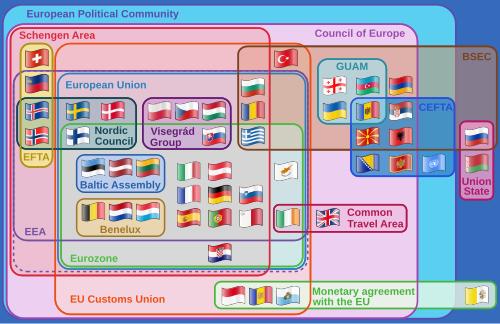
Back سياسة أوروبا Arabic Avropada siyasət Azerbaijani سیاست اروپا Persian Politik Eropa ID Política da Europa Portuguese යුරෝපයේ දේශපාලනය Singhalese การเมืองยุโรป Thai Avrupa'da siyaset Turkish Політика Європи Ukrainian Chính trị châu Âu Vietnamese

The politics of Europe deals with the continually evolving politics within the continent of Europe.[1] It is a topic far more detailed than other continents due to a number of factors including the long history of nation states in the region as well as the modern day trend towards increased political unity amongst the European states.
The current politics of Europe can be traced back to historical events within the continent. Likewise geography, economy, and culture have contributed to the current political make-up of Europe.[1]
Modern European politics is dominated by the European Union, since the fall of the Iron Curtain and the collapse of the Eastern Bloc of Communist states.[2] After the end of the Cold War, the EU expanded eastward to include the former Communist countries. As of 31 January 2020, the EU has 27 member states.[3]
However, there are a number of other international organizations made up predominantly of European nations, or explicitly claiming a European origin, including the 46-nation Council of Europe - the first post-war European organization, regarded as a fore-runner to the European Union - and the 57-nation Organization for Security and Co-operation in Europe (OSCE), which also includes the United States and Canada, as well as some central Asian states.[4]
- ^ a b "The EU - what it is and what it does". op.europa.eu. Retrieved 12 February 2023.
- ^ "Milestones: 1989–1992 - Office of the Historian". history.state.gov. Retrieved 12 February 2023.
- ^ "The Enlargement of the Union | Fact Sheets on the European Union | European Parliament". www.europarl.europa.eu. Retrieved 12 February 2023.
- ^ "Organization for Security and Co-operation in Europe". osce.org. Retrieved 12 February 2023.